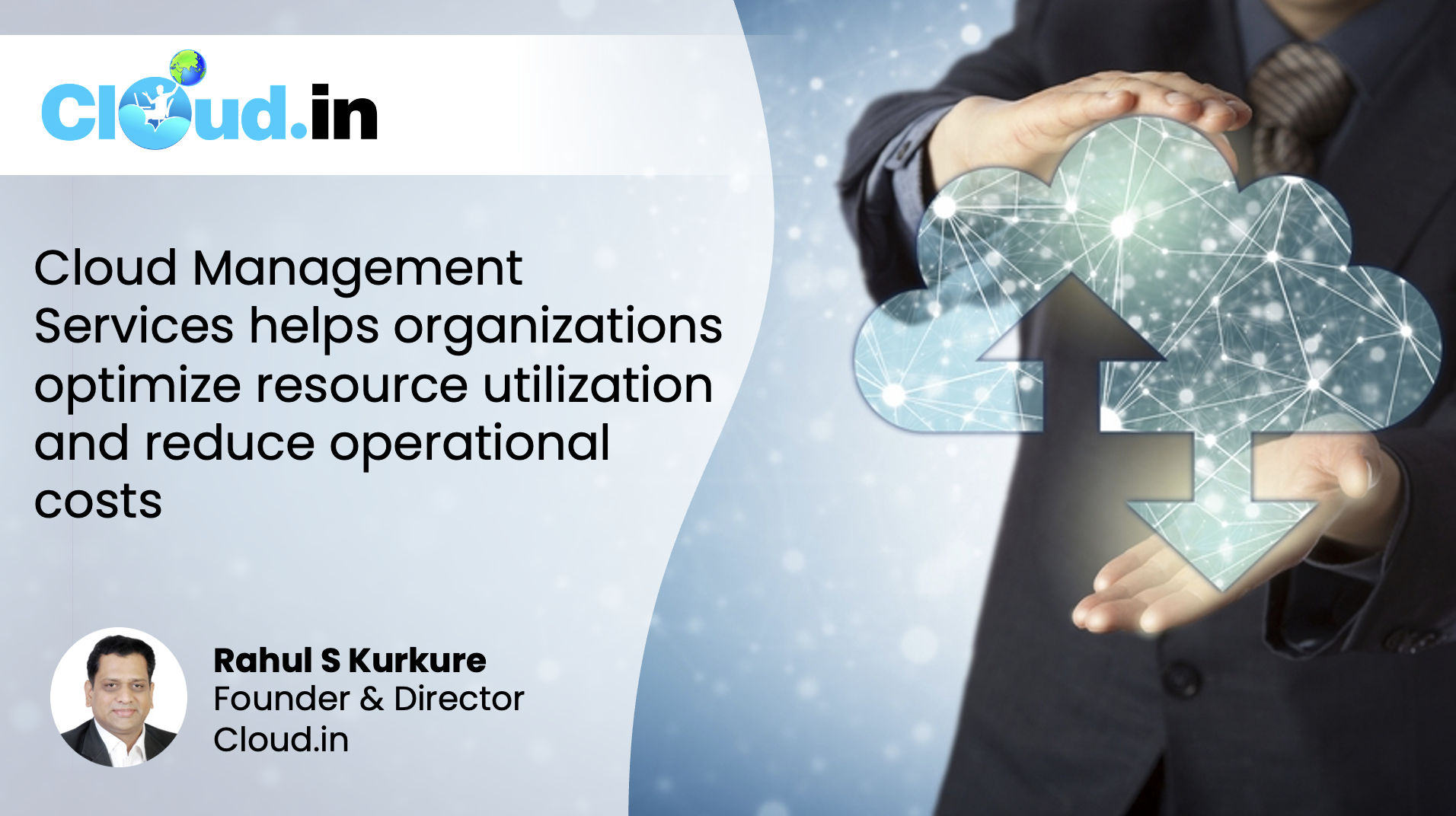Cloud Management Services helps organizations optimize resource utilization and reduce operational costs - Rahul S Kurkure, Founder and Director of Cloud.in

In today’s ever-evolving and fast-paced
business landscape, organizations that do not keep up with technological
advancements and seek innovative solutions will be left behind. Organizations across industry verticals in
this digital era are relying more and more on new-age technologies,
specifically cloud computing infrastructure to stay ahead of the curve. Having existed for many decades now, cloud
computing infrastructure continues to offer numerous business benefits to
organizations of all sizes. Elasticity,
scalability, pay-per-use model, streamlining of operations, and other
advantages it brings lead to significant improvement in the organization’s
bottom line. While cloud technology
delivers several business advantages, managing and optimizing these services
can be a challenge and time-consuming as well.
Businesses have to depend on IT expertise and 24/7 support to
efficiently leverage cloud services, but not all of them have the resources to
house an internal IT team that can keep pace with the constantly evolving
technology landscape. This is where managed service providers or MSPs can play
a crucial role in supporting organizations to effectively and efficiently
navigate the cloud landscape.
In this article, we will explore how cloud-managed services enable businesses to optimize resource utilization and reduce operational costs.
Cloud Managed Services by MSPs are third-party cloud services that are delivered to businesses to reduce the burden of organizations in managing their own infrastructure and cloud computing services. The services cover cloud infrastructure management, monitoring of resources, deploying applications, and the security aspect. By partnering with MSPs, organizations can focus on their core operations and increase their revenues by outsourcing cloud management to third-party service providers. The fast-growing cloud computing services have led to an increase in MSPs. According to MarketsandMarkets, the Cloud managed services market size is expected to grow from USD 99.0 billion in 2022 to USD 164.0 billion by 2027 at a CAGR of 10.6% during the forecast period.
Resource
utilization optimization is achieved
MSPs leverage several cost optimization
techniques by maximizing the utilization of all resources such as hardware,
software, and manpower, thereby eliminating waste that benefits businesses they
partner with. Resource Utilization
Optimization is the process of designing, deploying, and managing cloud
resources where performance is maximized and the cost is minimized while all
business-related requirements are met.
Optimization of cloud environments can be done by regularly monitoring
cloud usage, cleaning unused resources, and deleting temporary backup
resources. By leveraging automation and
orchestration tools, cloud operations are streamlined and optimized. Automating tasks such as instance
provisioning and deployment can bring down errors and save a significant amount
of time.
MSPs streamline the application management processes in the cloud and ensure they run smoothly. This approach helps in minimizing waste while enhancing application performance. They are able to auto-scale resources ensuring the infrastructure is right-sized where both underutilization of them as well as their limitations are significantly reduced.
Contribution
to Cost Reduction
MSPs with rich experience and unmatched
IT expertise can support businesses to design and implement cost-effective
cloud solutions. By partnering with
them, businesses not only reduce operational expenses but also optimize cloud
costs. It is crucial to continuously monitor and optimize cloud costs for
better utilization of resources and implementing cost management best
practices. As MSPs offer cloud-based
services, businesses are able to utilize much less hardware such as storage
devices and servers, eliminating capital expenditure. Moreover, they also ensure the devices are
regularly updated and well maintained.
The high cost involved in hiring and maintaining an in-house IT team is
eliminated as MSPs offer access to their team of experts as and when required
at a fraction of the cost. Since these
cloud service providers monitor organizations’ security 24/7 without impacting
the latter’s operations, no costs are incurred on downtime and the risk of data
loss is reduced.
Furthermore, organizations save significant amounts of money by not housing on-premise data centers that consume high energy leading to additional operational costs. MSPs leverage disaster recovery solutions that are more cost-effective when compared to on-prem backups which again reduces data loss and downtime saving costs. They support organizations by scaling resources as needed ensuring unnecessary costs are not incurred.
MSPs with the right expertise and
experience in the specific platform of industry verticals are sought after by
businesses. The capabilities and
specific offerings of MSPs can vary and organizations are free to opt for those
services that are in alignment with their business goals. These cloud service providers also have to
demonstrate the high value they bring to organizations and have to conduct
regular business reviews to assess their own performance. It is important to ensure that the MSPs
follow robust security practices and have all relevant compliance
certifications in place to continuously protect the critical data of the
partner organization while also being able to meet industry regulations.



